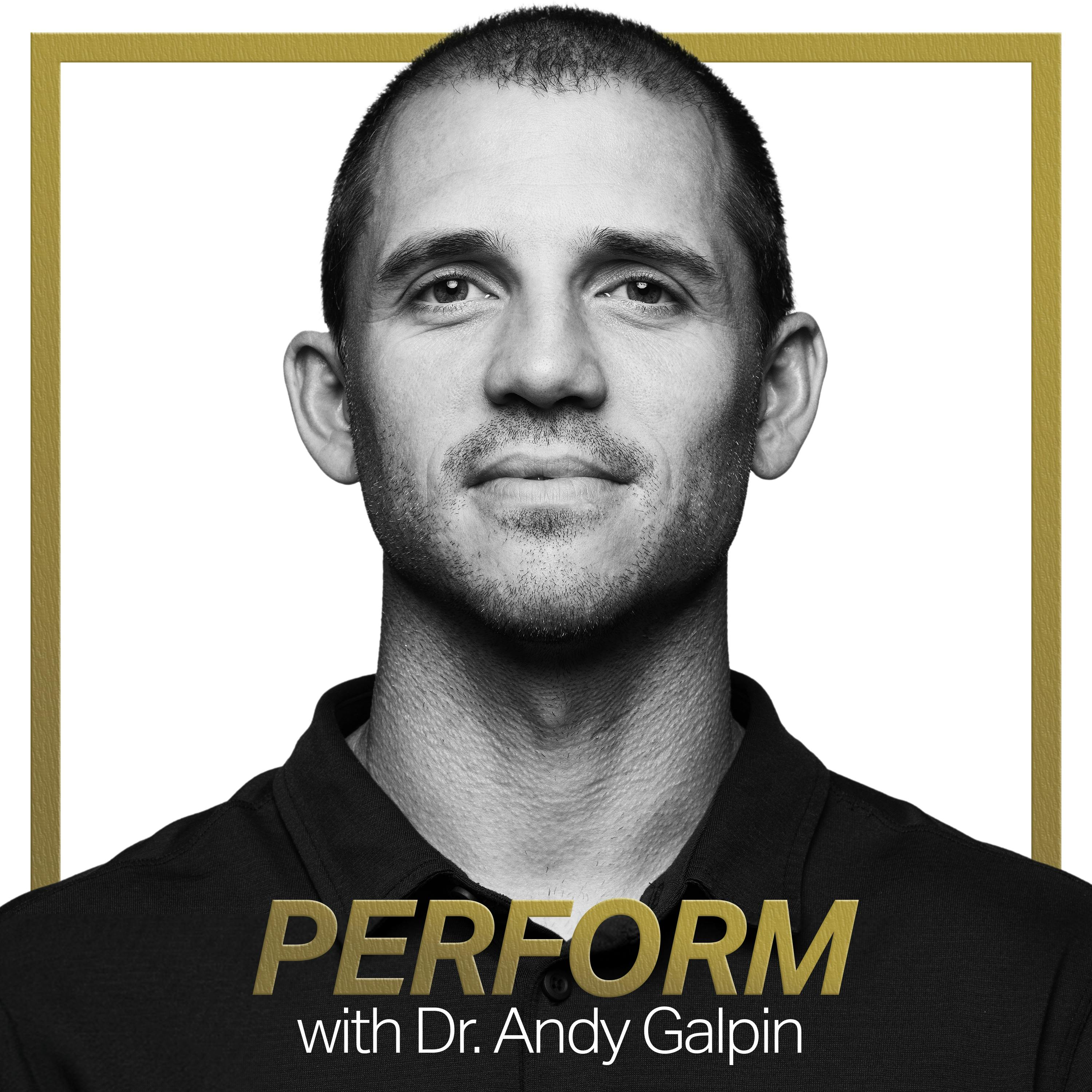
February 12, 2025 • 3hr 3min
Dr. Tommy Wood: Enhancing Brain Performance & Preventing Dementia
Perform with Dr. Andy Galpin

Key Takeaways
- Cognitive function is highly trainable through proper stimulus, supply and support
- Brain structure and function are directly linked - improving one tends to improve the other
- Exercise has direct causal effects on brain health through multiple mechanisms:
- Resistance training primarily benefits white matter and executive function
- Aerobic exercise benefits gray matter and memory
- High-intensity exercise may provide additional benefits
- 45-70% of dementia cases may be preventable through lifestyle modifications
- Brain fog often stems from basic lifestyle factors like sleep, stress, nutrition rather than brain pathology
Introduction
Dr. Tommy Wood is a UK-trained MD with a PhD in physiology and neuroscience from the University of Washington. He combines his clinical and research expertise to study how physical and mental challenges can enhance cognitive function both acutely and long-term. This conversation explores practical, evidence-based approaches to improving brain health through nutrition, exercise, sleep and other lifestyle factors.
Topics Discussed
Defining Cognitive Performance and Brain Health (2:33)
Dr. Wood explains that cognitive performance is difficult to precisely define and measure. While standardized tests exist for aspects like executive function and working memory, they don't capture all cognitive abilities.
- Brain structure and function are directly linked but have some redundancy
- Cognitive function is personal and depends on individual goals and demands
- Brain health should be viewed holistically, considering both structure and function
- Performance can be measured through:
- EEG signals and network connectivity
- Subjective feelings and function
- Standardized cognitive tests
Brain Function and Stimulus (8:12)
The brain responds to stimulus similarly to how muscles respond to exercise - function is driven by stimulus and proper recovery.
- Brain adaptations require appropriate stimulus, just like muscle growth requires mechanical tension
- Structure improves in response to functional demands
- Brain maintains plasticity throughout lifespan
- Brain volume can increase or decrease based on:
- Level of stimulus and engagement
- Nutritional status
- Overall health factors
Improving Cognitive Function Through Skill Development (12:13)
Dr. Wood discusses how cognitive function can be enhanced through proper skill development and training approaches.
- Near transfer vs far transfer of cognitive skills
- Near transfer: Getting better at specific practiced tasks
- Far transfer: Improvements that generalize to other domains
- Complex environments drive adaptation
- Virtual reality showing promise for cognitive training
- Multi-sensory inputs are important
- Lifestyle factors support cognitive enhancement
- Sleep quality
- Nutrition status
- Stress management
Assessing Short-Term Cognitive Health (20:13)
Basic blood tests can provide insights into cognitive function and brain health status.
- Key markers to assess:
- Vitamin D status
- Iron levels
- B vitamin status
- Omega-3 levels
- Blood glucose regulation
- Energy metabolism follows U-shaped curve
- Too little energy impairs function
- Energy toxicity also harmful
- Nutrient interactions matter
- B vitamins and omega-3s work synergistically
- Multiple nutrients required for optimal function
Long-Term Brain Health Strategies (27:19)
Dr. Wood outlines his "3S Model" for maintaining cognitive function: Stimulus, Supply, and Support.
- Stimulus:
- Cognitive engagement
- Novel learning experiences
- Physical exercise
- Supply:
- Cardiovascular health
- Nutrient status
- Energy availability
- Support:
- Sleep quality
- Stress management
- Avoiding harmful exposures
Task-Switching and Cognitive Load (35:00)
The impact of multitasking and task-switching on cognitive performance is discussed.
- True multitasking is impossible - we task-switch instead
- Task-switching has significant cognitive costs
- Reduced performance on all tasks
- Increased stress levels
- Greater mental fatigue
- Better to periodize cognitive work
- Focused deep work periods
- Lower intensity maintenance work
Nutrition and Supplementation for Brain Health (47:22)
Evidence-based approaches to nutritional support for cognitive function are covered.
- Key supplements with evidence:
- Creatine for memory and energy
- Caffeine for alertness
- B vitamins for methylation
- Trade-offs exist
- Enhanced function in one area may impair another
- Individual response variation is significant
- Timing and dosing matter
- Match supplements to cognitive demands
- Consider sleep and recovery needs
Brain Fog and Cognitive Decline (1:00:55)
Dr. Wood explains how to address subjective cognitive decline and brain fog.
- Common causes:
- Poor sleep quality
- Chronic stress
- Nutritional deficiencies
- Inflammatory conditions
- Assessment approach:
- Rule out basic lifestyle factors first
- Check nutritional status
- Consider inflammatory markers
- Most cases are reversible with proper intervention
Exercise and Brain Health (2:28:44)
The specific benefits of different types of exercise for brain health are detailed.
- Resistance training:
- Improves white matter integrity
- Enhances executive function
- Minimum 2 sessions/week
- Aerobic exercise:
- Benefits gray matter volume
- Improves memory function
- High intensity may provide additional benefits
- Optimal protocol combines both resistance and aerobic training
Preventing Cognitive Decline (2:13:18)
Evidence suggests 45-70% of dementia cases may be preventable through lifestyle modification.
- Key preventive factors:
- Education and cognitive engagement
- Physical activity
- Social connection
- Nutrition optimization
- Sleep quality
- Critical periods exist
- Early life education important for peak function
- Ongoing stimulus maintains function
- Multiple mechanisms involved
- Vascular health
- Inflammation control
- Metabolic function
Conclusion
This comprehensive discussion with Dr. Wood highlights the tremendous potential for enhancing and maintaining cognitive function through evidence-based lifestyle interventions. The conversation emphasizes that brain health is not predetermined but rather highly responsive to proper stimulus, supply, and support throughout life. By understanding and implementing these principles, significant improvements in both short-term cognitive performance and long-term brain health are achievable.



